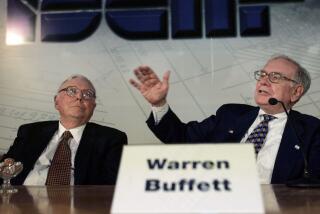At 80, Tubby Burnham Remains Active by Starting New Ventures : Wall Street: One of the nation’s most respected money managers expresses dismay about the rapid changes in his profession.
NEW YORK — A half century after he began a Depression-era stock brokerage with borrowed money and parlayed it into one of the most powerful securities giants in America, Tubby Burnham has started over again.
Drexel Burnham Lambert Inc. founder I. W. Burnham II, one of Wall Street’s oldest, best-known and most respected money managers, has created two new companies and is managing an investment fund for clients he describes as mostly “a lot of rich widows.”
“I don’t know how to loaf,” said Burnham, who turns 81 in January. “I’m not very good at taking it easy.”
Burnham is known as Tubby among friends and family because he weighed nearly 200 pounds as a teen-ager, when his parents stuffed him with food to help cure typhoid fever. He retired from active management of Drexel Burnham Lambert in 1977 and is now its honorary chairman.
He had no involvement in the scandal that consumed the firm, one of the biggest financial sagas of the 1980s and an outgrowth of confessions by imprisoned inside trader Ivan F. Boesky.
After a long federal investigation, Drexel agreed earlier this year to plead guilty to six securities fraud felonies, pay more than $650 million in penalties and subject itself to unprecedented government.
Drexel is now about half its former size of 10,000 people because of a post-scandal restructuring that included the sale of its retail brokerage operation.
The scandal also forced the firm to fire indicted bond financier Michael Milken, whom Burnham personally had hired. It was Milken who helped his erstwhile employer vault to the top ranks of Wall Street investment banks.
In an interview, Burnham declined to talk about the scandal or the implications for the firm and its current management.
“I’d rather talk about my own little world and not about theirs,” he said. “I’ve avoided getting into that public discussion of Drexel’s problems.”
But Burnham did recount the time in 1973 when he hired Milken, then a young bond trader working at Drexel Firestone, a struggling investment firm that Burnham’s company was about to buy.
Milken, considered the smartest trader on Drexel Firestone’s staff, was ready to quit and teach at their common alma mater, the Wharton School at the University of Pennsylvania.
“I had a talk with Mike, right that day, and I said, ‘Why do you want to leave?’ He said, ‘Because I think Drexel’s going broke; they’re not even going to pay me,’ ” Burnham recalled. “Well, I said, ‘It’s not going broke; we’re taking them over. We’re going to pay you.’ ”
Burnham quadrupled the amount of bonds that Milken could risk in overnight market positions from $500,000 to $2 million and let him keep a percentage of the trading profits.
“The first year, he made $2 million on the $2 million I gave him. The next year I gave him $4 million,” Burnham said. “He made $4 million on that. He was an absolute winner.”
By the time Burnham retired from active management, he said, Milken was trading $800 million worth of bonds a day. “He was making a lot of money for the firm and for himself.”
Under the direction Milken helped set for Drexel Burnham Lambert, it became the undisputed leader in a then-new form of high-yield debt securities known as “junk bonds,” which eventually became the tool to finance hostile corporate takeovers and debt-financed transactions known as leveraged buyouts.
Drexel itself became known as the investment banker for some of the most feared raiders in America, from Carl Icahn to T. Boone Pickens. It was an image that came to symbolize Wall Street gluttony, and it aroused enormous controversy.
In sharp contrast to Drexel’s image, Burnham himself typifies one of the most cautious, conservative and old-fashioned voices in the investment business. He was chairman of the Securities Industry Assn. in 1976 and often has expressed concern about the rapid pace of change on Wall Street.
He worries about excessive corporate debt, risky bank loans, market-jolting computerized trading strategies and exotic financial products that range from stock-index futures to foreign currency options.
Burnham expresses irritation at what he calls the impatient generation of young people who have invaded his profession.
“When I went into it, you did everything,” Burnham said. “Now, young kids come out of college and want to be instant millionaires.”
Born in Baltimore in 1909, Isaac Wolfe Burnham is the son of a doctor and is named after his grandfather, a German immigrant who founded the I. W. Harper Tennessee whiskey distillery but lost his fortune during Prohibition. “That’s why I’m still working,” Burnham said.
He was in college when the stock market crashed in 1929, and his father telephoned to say he was practically broke. Nonetheless, Burnham decided he wanted to work on Wall Street and joined his uncle’s firm in 1931, one of the toughest times to be peddling stocks.
He founded his own firm four years later with a $100,000 loan and has been trying to outwit the stock market since.
Before the October, 1987, stock market crash and the sharp break this past October, Burnham had predicted that Wall Street was ready for major selloffs. He believes Wall Street is struggling through another bear market and contends that the nation already has slid into recession.
In September, as part of Drexel’s post-scandal restructuring, he and a group of investors acquired the company’s $160 million Drexel Burnham Fund, which he already had been managing.
Burnham renamed it the Burnham Fund, the same name he had given it 20 years earlier. It has risen six-fold in value since then and is up more than 17% this year.
He also started Burnham Securities Inc. and Burnham Asset Management, with headquarters a few blocks from Drexel. But his main love is managing the fund.
“I have a lot of clients, generally widows of my friends,” he said. “I’ve made them nothing but money.”
More to Read
Inside the business of entertainment
The Wide Shot brings you news, analysis and insights on everything from streaming wars to production — and what it all means for the future.
You may occasionally receive promotional content from the Los Angeles Times.










